If You Eat Honey, Read This
Disclosure: This post may contain affiliate links
If you are a vegan who eats honey, you need to read this because it's likely you've never been told it before.

What's in this post
I’m going to get straight to the point: this article is about honey. That’s right, another article that talks about vegans who eat honey.
I can almost hear the “pragmatic vegans” across the world collectively sighing right now.
I know there are plenty of people who wish that vegans would stop talking about whether or not honey is vegan- I’m one of them. Of all of the topics about veganism out there, honey is one of the most divisive.
But if you are a vegan who still consumes honey, then you need to know what I’m about to tell you because it’s likely you’ve never heard it before.
What You Don’t Know Can Hurt Animals
Some well-intentioned people overlook the use of honey because of the widely spread myth that honey and bee products are all-natural by-products of the necessary pollination of our own food crops.
To make matters more confusing, some vegan bloggers and vegan organizations with large audiences have explicitly stated that avoiding honey is only something that extreme vegans do in hopes of attaining vegan perfection. Whatever that means.
By now you’ve probably read quite a few articles about honey consumption. Here’s a shortlist of the reasons to avoid honey that might have been mentioned in those articles:
- Bee colonies are nothing more than factory farming for bees
- Bees get injured or killed during the harvesting of honey
- Bees pollinate crops and are good for the environment (or are they?)
- Only vegan purists avoid honey
- There are a slew of honey and bee product alternatives to eat, burn, and slather on lips
And all of that is true.
But here is what most articles leave out: honey is tested on animals.
Let me rephrase that, honey is tested on dogs (and cats, horses, donkeys, cattle, sheep, goats, rabbits, mice, and rats).
The Honey – Animal Testing Connection
The connection between honey and animal testing isn’t something I recently learned. I discovered this dirty little secret when I was researching the purported health benefits of honey for what is one of the most popular guides I’ve ever written, Is Honey Vegan?
If you’ve never read the guide, please do. Not only do I talk about the issues surrounding the consumption of honey, I also provide a guide to all the alternatives out there. It’s extremely comprehensive, and there isn’t anything else like it on the internet that I know of.
Discovering that honey is tested on animals shocked me. I thought it would shock others, too. Generally speaking, I was wrong.
I get the most unfollows on social media any time that I even dare to utter the word honey. Each time I do, I mention animal testing. It’s been my experience that people have no idea that these studies exist. I’ve never seen it addressed on any other vegan website, or in any other article about honey and veganism.
The strange thing is, when I start talking about these tests people tend to stop listening. It’s as if they’d rather not know. People get very angry when you tell them that honey isn’t vegan.
Sorry not sorry, get mad. Honey isn’t vegan.
Recently, I came across an article about animal studies and honey that I hadn’t seen before. What I read made me sick to my stomach and I knew that I’d have to write about honey again.
And this time, I’m hoping that this information changes the conversations about honey and veganism forever.
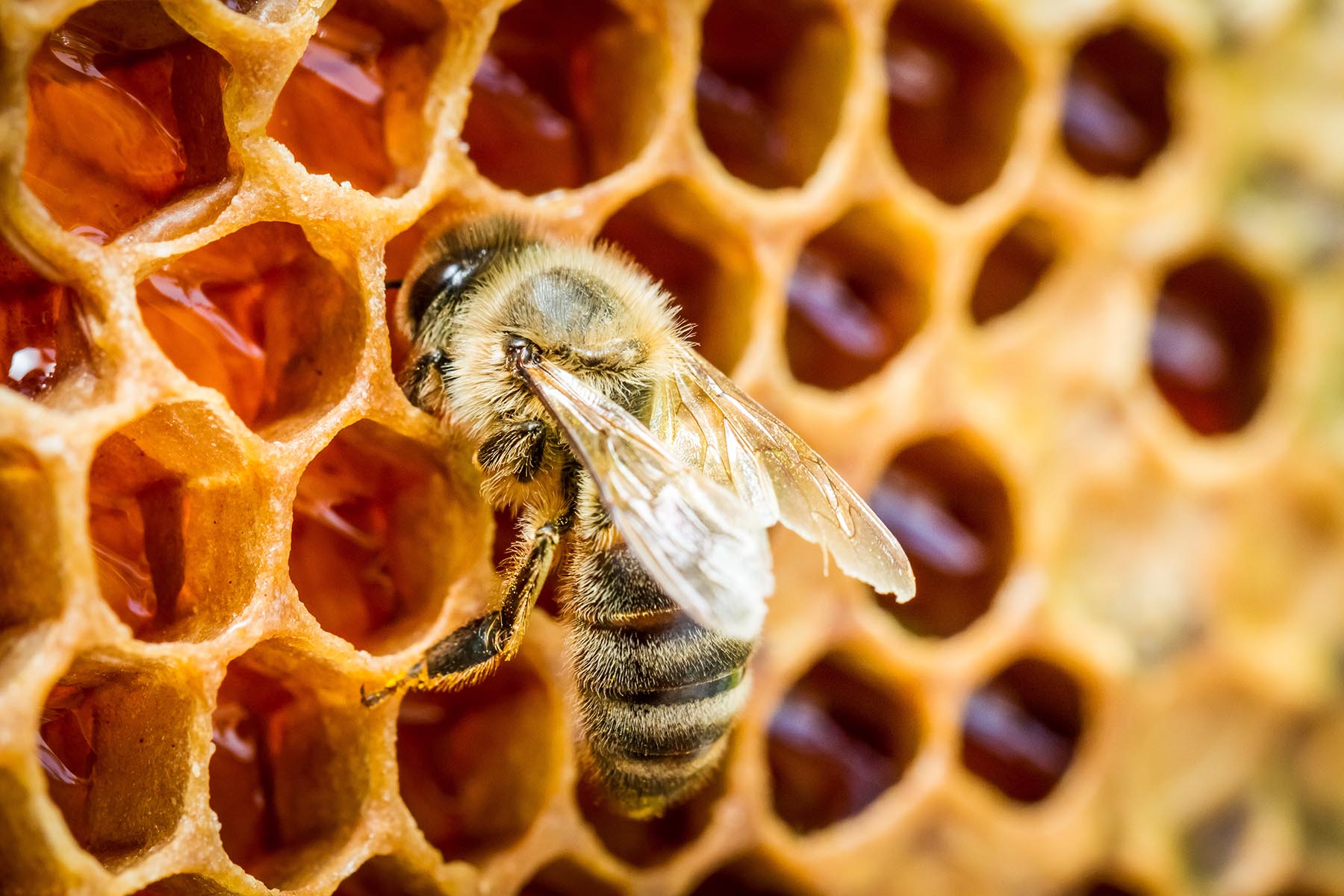
Bee in a honeycomb / Photo: Adobe Stock
Introduction
In 2015, the Jordan University of Science and Technology published a comprehensive review of the most recent findings of published experimental and clinical trials on honey.
These studies used honey as an agent for would healing enhancement in various animal models from all over the world.
According to this review, non-healing wounds are often associated with high morbidity in both human and veterinary medicine. The growing emergence of antimicrobial-resistant bacteria presents great medical challenges.
So, research has been focusing on finding alternative therapies that can potentially prevent and/or eliminate the threat of resistance, enhance healing, and stimulate tissue repair.
That’s where honey comes in.
Honey has an unusual chemical makeup. It’s low in moisture, extremely acidic, and has an environment that bacteria and microorganisms cannot grow in but which keeps honey from spoiling almost indefinitely. Bees add an enzyme, glucose oxidase, to honey that creates hydrogen peroxide as a by-product.
Because of this, researchers believe honey could become the alternative therapy that they have been looking for.
But you know what? Aloe vera has also shown to have significant improvement with both pain management and healing with posthemorroidectomy patients. (1, 2)
So why couldn’t we simply use aloe vera, an already proven effective therapy?
The Tests
There are many reasons why people choose to live a vegan life.
Some people care about animals, others about the environment, and some just care about their own health. To each their own. I don’t care why someone is vegan, I only care that they are.
I am vegan for the animals first and always.
Personally, knowing that honey comes from a bee (an animal) is enough to stop me from consuming it. And if that or the other eight reasons I listed above wasn’t enough, knowing that honey is tested on animals would absolutely stop me from eating it.
I hope that by sharing the general specifics about these tests that I will finally eliminate all doubt that vegans should not be consuming honey.
Keep in mind, these are just a few of the tests, there are many more.
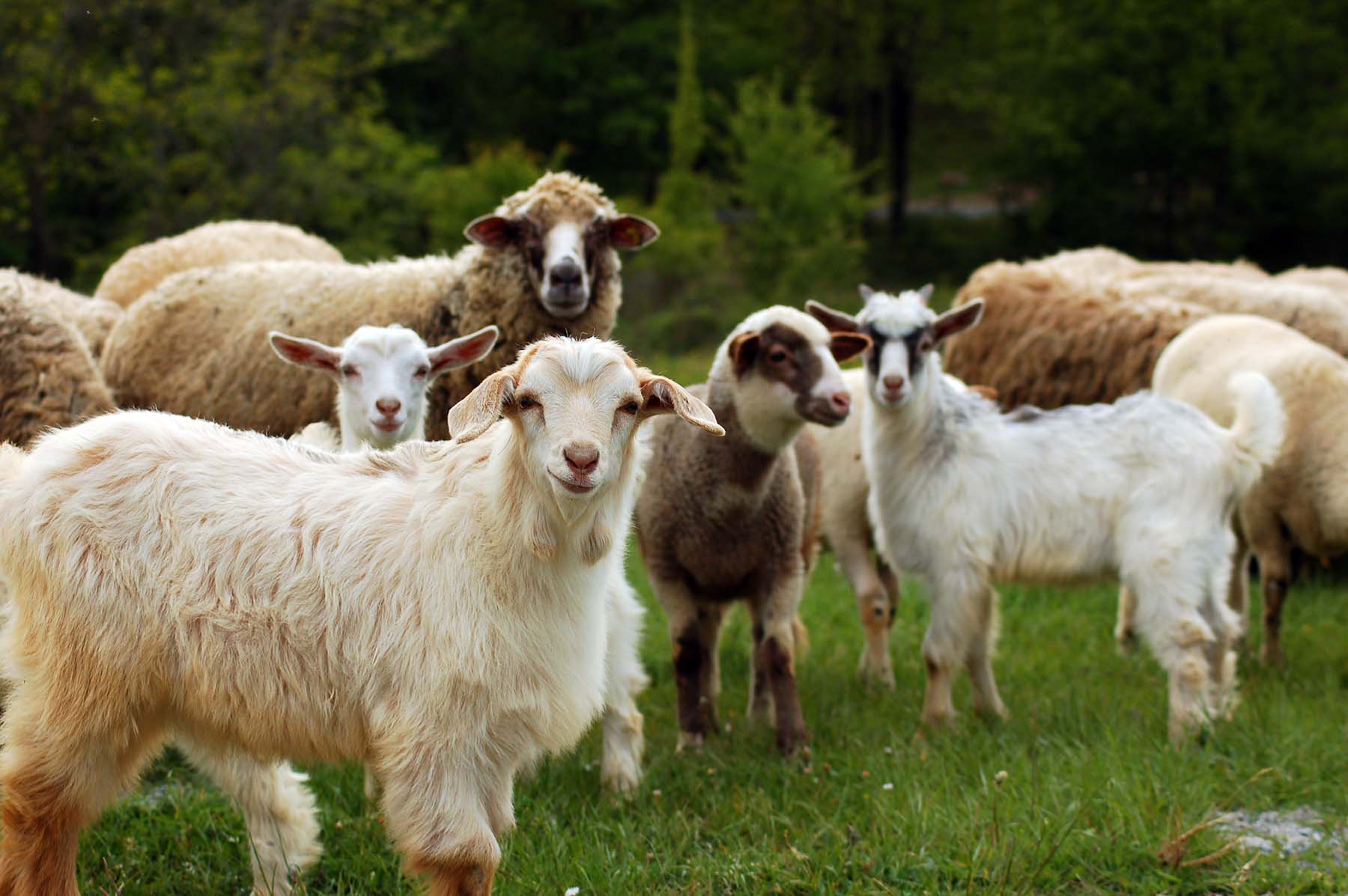
Sheep and goat / Photo: Adobe Stock
Cattle, Sheep, and Goats
In Kenya, honey has been used for the treatment of foot and mouth disease in dairy cattle. (3) In Algeria, honey was used after eye enucleation in a dairy cow. (4)
In these instances, the animals used in testing were not surgically wounded to qualify for testing, but this isn’t always the case.
In Iraq, a study was conducted to evaluate the effect honey has on the healing of full-thickness wounds in 12 Awassi sheep. A 5 cm full-thickness skin wound was surgically created on the right flank of each animal. Honey was then rubbed on to see if an infected would would heal faster. (5)
In Nigeria, honey was used to treat experimental surgically-created wounds in Nigerian Dwarf goats. (6)
Just to be clear- a full-thickness wound is defined as a would with skin loss where subcutaneous fat may be visible but bone, tendon, or muscle are not exposed.
In other words, ow. And “surgically-created” means a human-induced wound made for the specific purpose of studying.
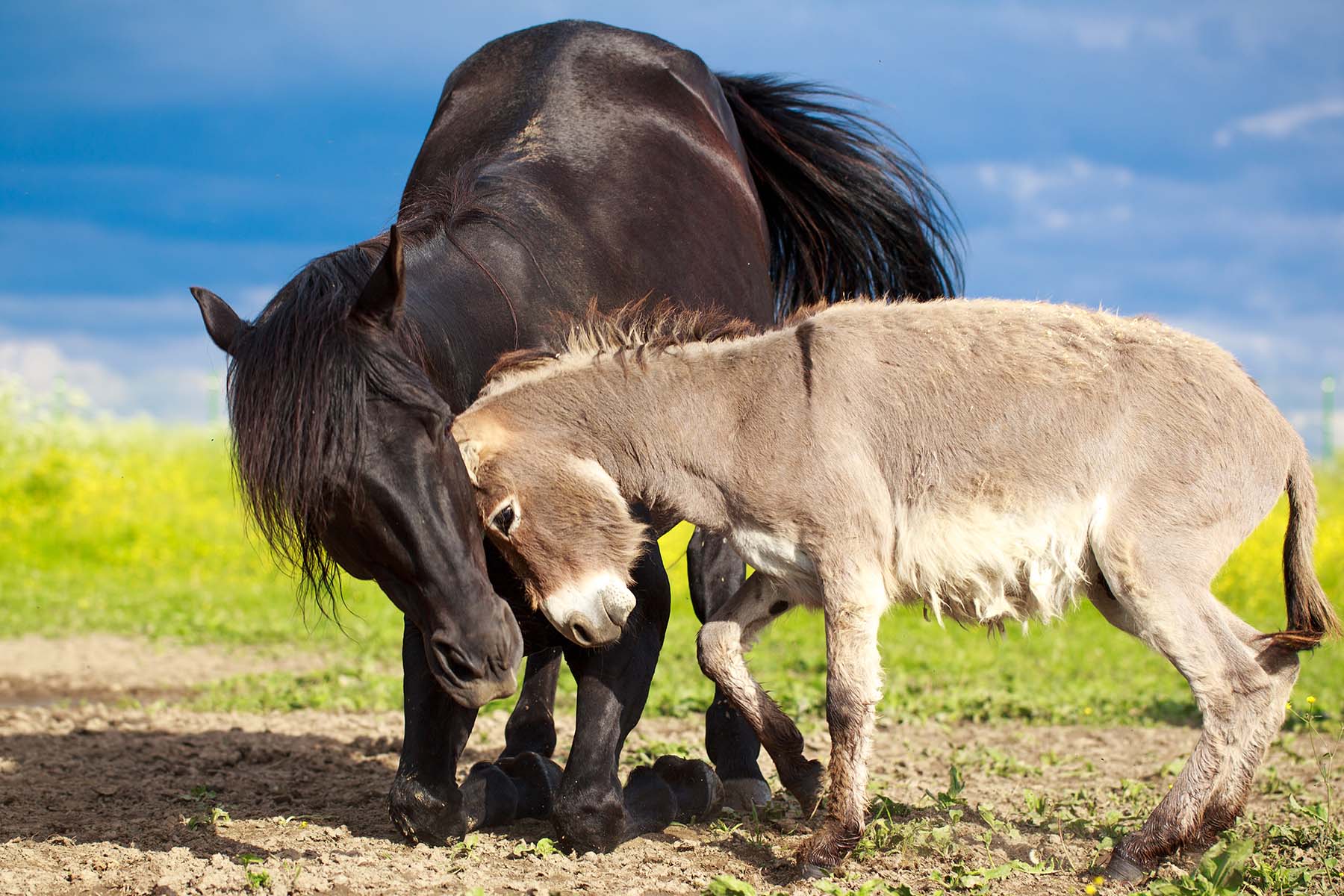
A horse and donkey / Photo: Adobe Stock
Horses and Donkeys
Here in the United States, the effect of topical application of honey on the healing of a second-intention wound- a wound that is left open to close naturally- was performed on horses.
A wound was created on the horses legs, contaminated with feces, and bandaged for 24 hours. Honey was then used to see if it would reduce the duration of the infection. (7)
In Egypt, the efficacy of a honey and cod liver oil mixture for wound treatment was conducted using 18 wounds on nine donkeys. (8) They also performed tests using propolis (the resinous mixture collected by honey bees from tree buds, sap flows or other botanical sources, which is used as a sealant for unwanted open spaces in the hive) as a wound dressing for old wounds.
This time testing was performed on 18 horses and 14 donkeys. These wounds were also surgically induced. (9)
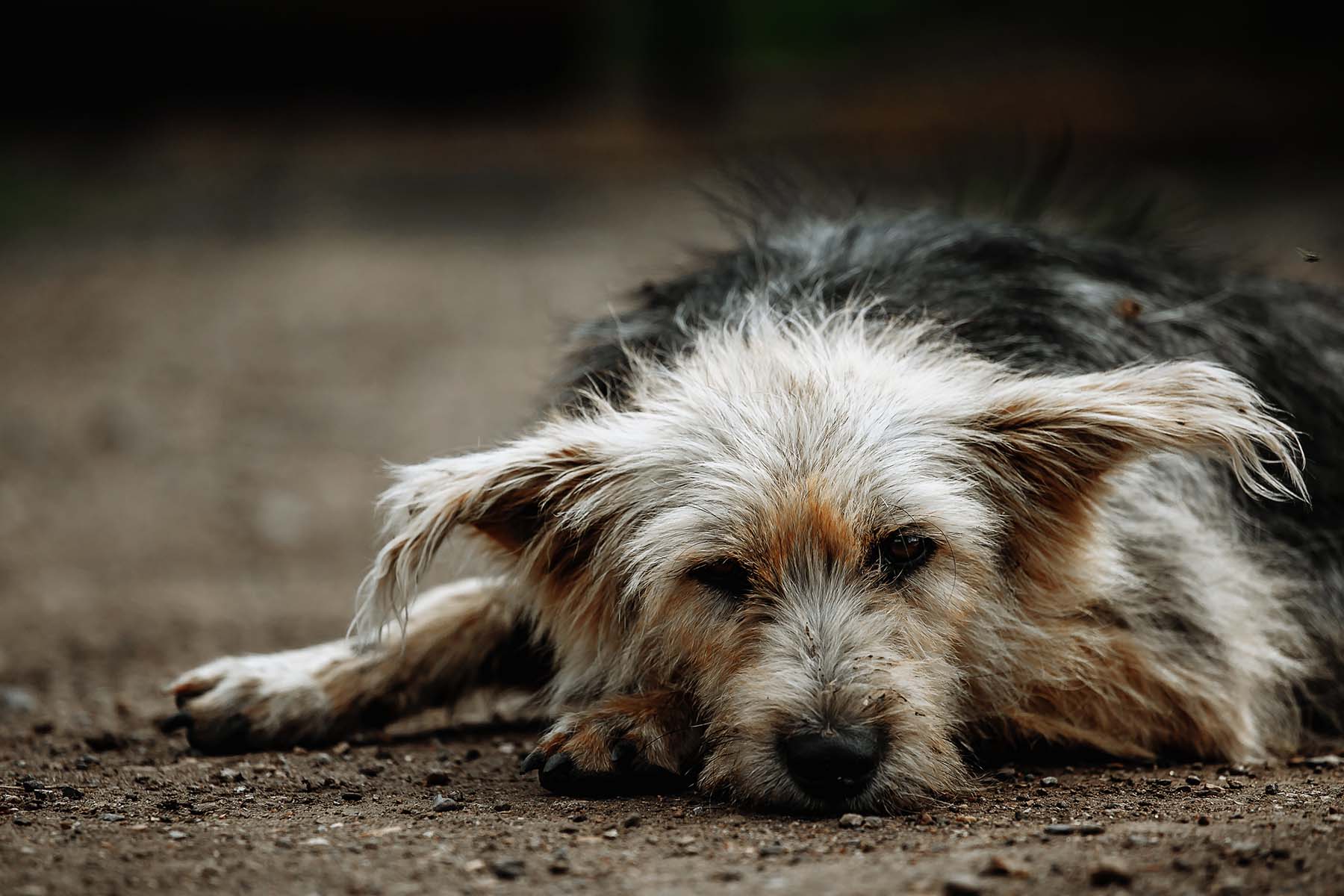
A street dog / Photo: Adobe Stock
Dogs and Cats
The use of dogs and cats in animal experimentation is widely supported by the scientific community.
Cats are routinely used in the filed of neurology and human biology. Dogs are used for medical research, hormonal disorders, cardiology, and osteopathic studies. (10)
And both are used in the studies of the efficacy of honey use in wound healing.
In a study conducted in Nigeria, research was performed on 24 young (three to four month old) mongrel dogs. The dogs underwent surgical removal of 70% of the small intestine. They were given an oral glutamine-honey combination to determine the wound healing and closing times in the dogs.
A similar clinical study was performed in Iran on 30 dogs. Rectangular wounds were created on both sides of spine and honey was used to treat the areas for a period of 28 days. (11, 12)
The effectiveness of using propolis for treatment of surgical full-thickness skin wounds in dogs was also studied by surgically-creating five full-thickness wounds on the back area of 20 mongrel healthy dogs. (13)
In Ontario, Canada, the successful use of honey was described as a wound dressing for the treatment of an open wound in a cat, which resulted from feline gangrenous mastitis. (14)
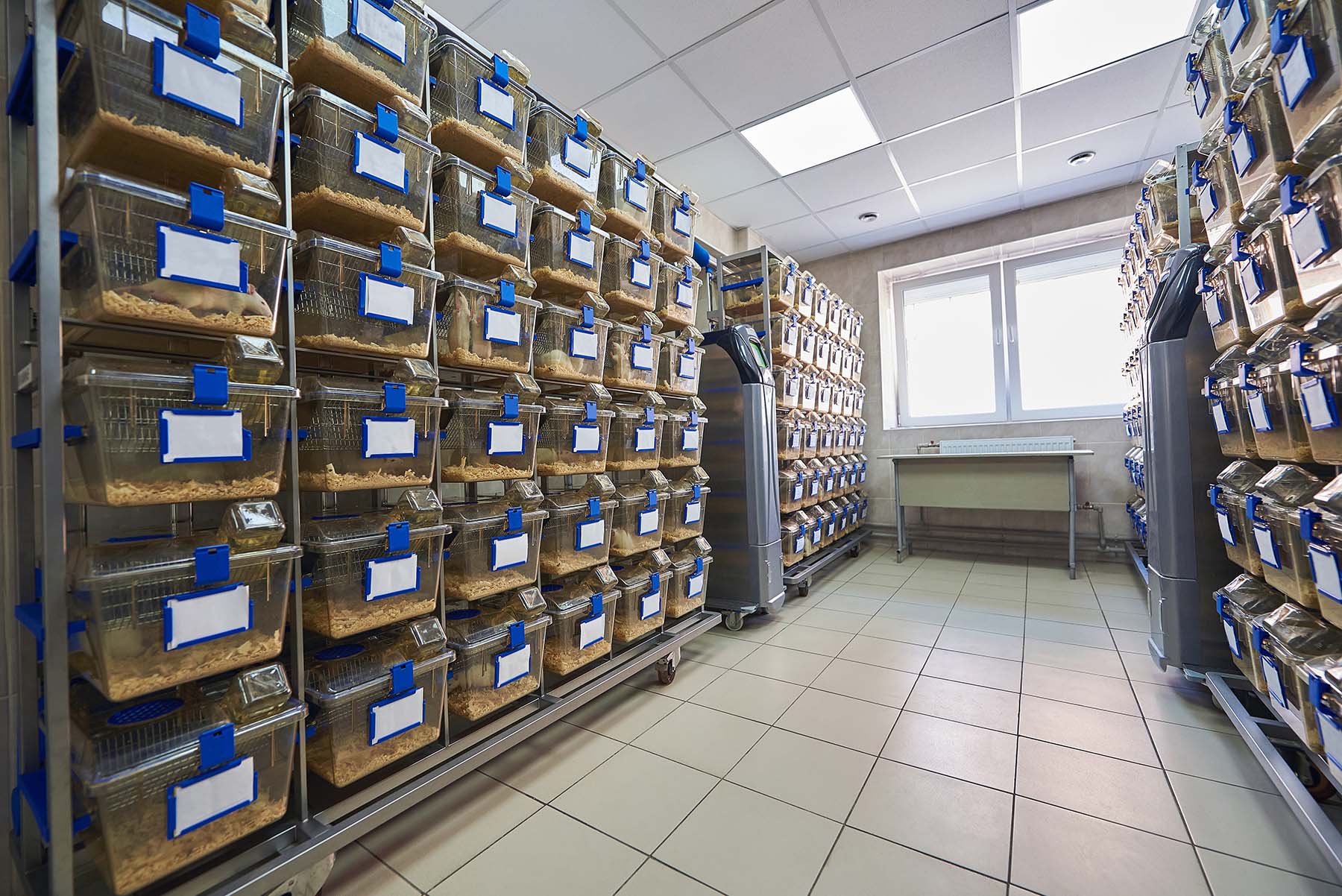
Laboratory rats / Photo: Adobe Stock
Laboratory Animals
Many different species of animals are used in animal testing, but the most common include mice, rats, guinea pigs, hamsters, rats, rabbits, and fish.
The most common laboratory animals to be used in the study of honey have been mice, rats, and rabbits. The 2015 review published by the Jordan University of Science and Technology detailed 17 different clinical trials and experimental control studies using these animals.
These studies relied on methods such as surgically inducing full-thickness wounds in mice and rats, as well as chemically-inducing burn wounds on rabbits.
One test detailed using 45 adult Sprague-Dawley rats that underwent a laminectomy. As a reference, a laminectomy is the removal of the back part of the vertebra that covers the spinal canal. The laminectomy site was treated with honey to determine its effects on healing. All rats were killed 4 weeks after laminectomy. (15)
In another study, one hundred and seventy-two young rats were surgically wounded and then treated with honey to determine the rate of healing. After three weeks, all one hundred and seventy-two rats were killed. (16)
And in yet another study performed on rabbits, honey was mixed with Pistacia lentiscus fatty oil (PLFO) to enhance the healing of burn wounds created using the standard burn wound model. (17)
It’s worth noting that the standard model for burns was developed on pigs and it’s pretty terrible. (18)
Here’s the description from one such burn study done on rabbits:
Four burns of identical size (3 cm in diameter) were created on the back of each animal, two cranially ( left and right) and two caudally (left and right), by a metal cylinder weighing 200 g immersed in prior in boiled water for 3 mins and maintained on animal skin 15 seconds. (19)
That’s terrifying.
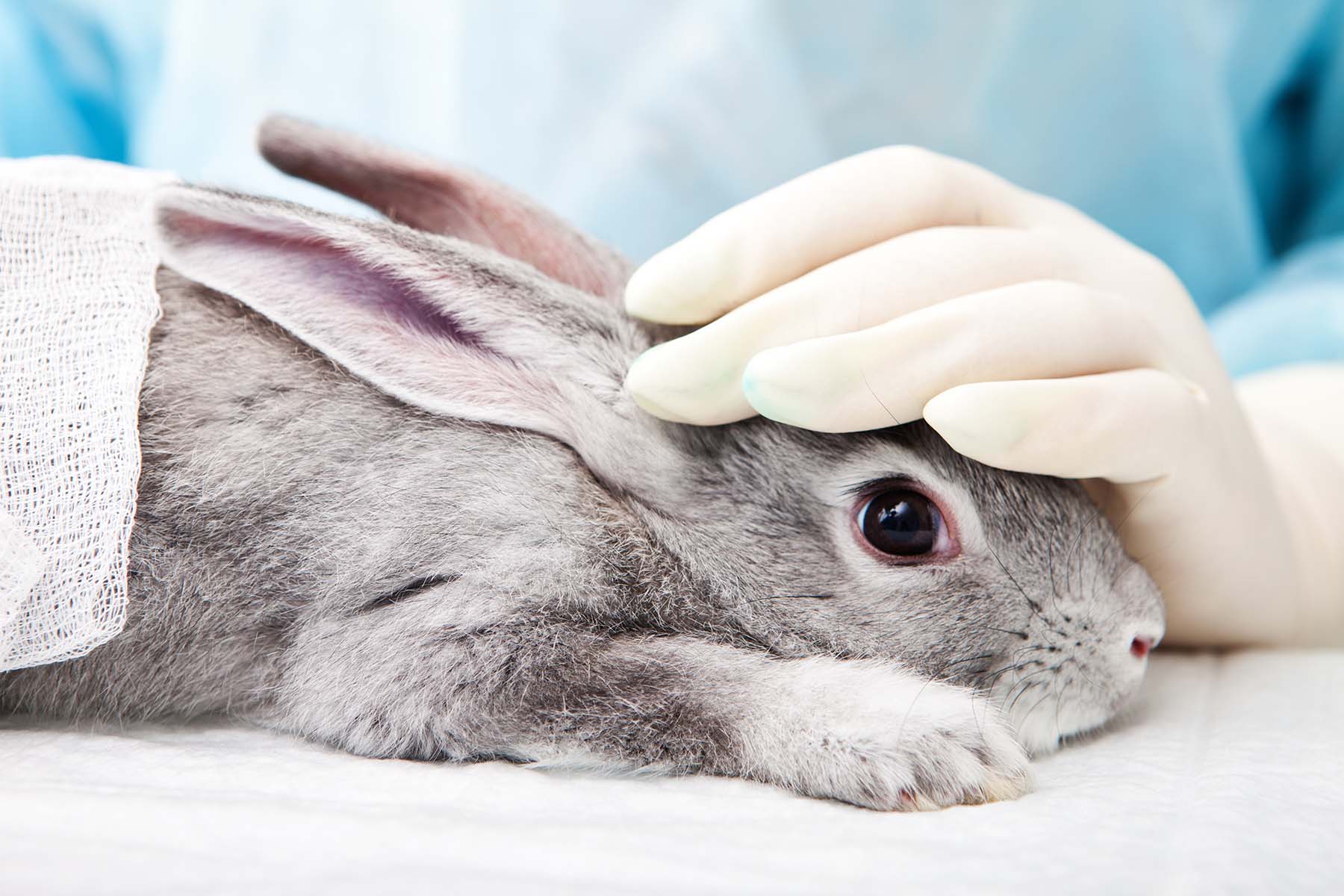
Laboratory rabbit / Photo: Adobe Stock
Millions of Animals Die from Animal Testing Every Year
It is estimated that more than 115 million animals worldwide are used in laboratory experiments each and every year. Horrifyingly, because only a small portion of the countries actually collect and publish data regarding these numbers, the actual number is unknown.
Here in the United States, up to 90 percent of all animals used in animal testing are excluded from official statistics. This means that the figures published by the U.S. Department of Agriculture are only an estimate.
According to data, more than 12 million animals are used each year within the European Union. (20)
These numbers are staggering.
It’s unknown how many animals are devoted to honey testing. What we do know is that interpreting the results obtained from these studies is rather difficult and usually hampered by a bunch of factors including:
- the great variation in types and origins of honey
- the type of animal species used as models
- the type of wounds
- the number of animals
- the number and type of controls
- and variation in treatment protocols
And believe it or not, that’s not all that unusual for animal testing.
Animal Testing Returns Inaccurate Data
Most people believe that animal testing is necessary in order to help prevent or cure human illness and diseases, but this is largely untrue. Animal models are cruel, expensive, and unreliable.
According to The Physicians Committee for Responsible Medicine, drugs tested on animals have a 92% failure rate. This means they are certified safe as a result of animal studies, but then fail in human clinical trials or once they reach the public.
It doesn’t have to be this way.
Learn more about animal testing by visiting pcrm.org and find out how you can help stop unnecessary testing on animals.
Conclusion
There are a lot of reasons that vegans, or anyone, should avoid consuming honey- animal testing is just one of them.
But if you ask me, it’s a big one.
Not only that, it’s something that a lot of people don’t know.
So, the next time you’re on social media and you see someone post something about how they are a vegan who eats honey, send them this article and the Vegan’s Guide to Honey.
Because honey isn’t some magical ingredient that no one can avoid. It’s an animal product that has been mass marketed and mass manufactured for generations- and it’s been tested on animals.
With so many vegan alternatives available, honey is not only exploitative, it’s unnecessary.
Updates to this article
Since writing this article I’ve had quite a few of the same comments and/or questions.
The most frequently mentioned one has been that everything has been tested on animals at some point, so it’s pointless to avoid honey and/or the mere fact that honey is tested on animals isn’t a good basis for the honey debate.
Please keep in mind, I listed 9 other reasons to avoid honey even before I started talking about animal testing. Those reasons are expanded upon by clicking through to the Vegan’s Guide to Honey. I go into much more detail about those other reasons there.
This article is specifically addressing one largely unknown fact- honey is tested on animals.
As someone who lives as a vegan, I know that there are animal ingredients in this non-vegan world that I cannot avoid such as cars, computers, medications.
Since I can’t avoid everything, I avoid everything I can. Like honey.
Truth in Advertising
I am committed to providing accurate information to the vegan community. Meticulously researched, the topic explored in this guide contains the knowledge available at the time of publishing. Reviews and updates happen when new material becomes available.
Please contact me if you find incorrect data.

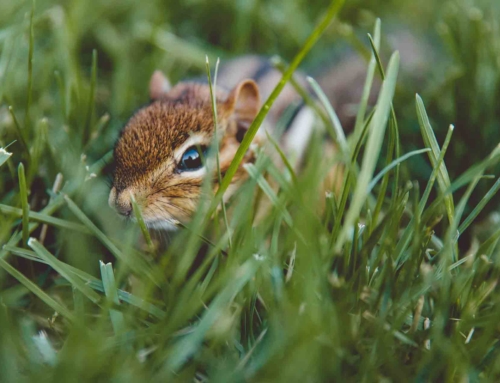

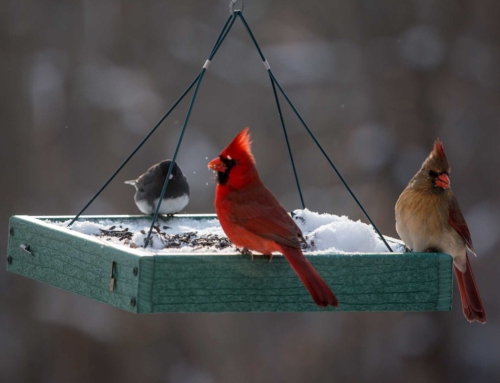


Great article, highlighting ONE of the wrongs about the big industry that honey farms, so to speak, have created. I am a vegan, but not a purist: I have eaten honey from a local beekeeper who treats his colonies well. I have even had a couple of fried eggs from a back-yard rescue-chicken, and I’m not ashamed of that. It’s all about the perspective: I just say NO to the torturing and tormenting of animals, and yes, insects among them, and the world around us. And perhaps if more did, then the world around us might last a few generations longer and we might enjoy it in the time we have left.
It sounds like honey is actually a good thing if the studies I see are correct and it’s for wound healing. It’s not the honey’s fault or the bees fault that humans are using it for testing. With your way of thinking, you might as well blame aloe Vera for use in testing and ban all use of aloe Vera.
[…] Honey isn’t some magical ingredient no one can avoid. It’s an animal product that has been mass marketed and mass-manufactured for generations, and it’s been tested on animals. With so many vegan alternatives available, honey is not only exploitative; it’s unnecessary.’ https://www.yourdailyvegan.com/vegan-guides/is-honey-vegan/ https://www.yourdailyvegan.com/2016/03/if-you-eat-honey-read-this/ […]
[…] of our species ‘farming’ of those whose honey we steal for our financial advantage. Honey is definitely not vegan and despite misleading articles that suggest otherwise, it’s not…There are always going to be humans who want to carry on indulging their taste buds and convenience […]
You said that there are some things that you cannot avoid like cars, computers, and meds. It would be interesting to know how cars and computers aren’t vegan, and I believe you, I just don’t know. But it’s certain that meds are not vegan and so avoiding them as much as possible is the best way to go. I do that.
What if they tested pumpkin seeds on animals? Exactly. Personally, I eat honey.. namely cause I don’t care about insects. I kill those I see in my home and actually most vegans I know do too! I killed the lice on my child’s head.. Would you just live with a cockroach infestation? why draw a hard line when it comes to bees?
[…] point worthy of mention is that honey is also tested on other animals. This includes dogs, sheep, cattle, horses, donkeys, goats, rabbits, mice, cats and […]
It seems that we take the honey that bees make to get them through the winter and replace it with sugar water which leaves the bees open to infection. Why can’t we take just a little honey and leave most of it for the bees? they make it for themselves not for us.
Domestic honey bees rely on humans to survive. They have co-evolved with humans and will die out without human intervention. I guess its the same with domestic animals used for meat. If you stopped using them for meat, domestic animals would simply die out or breed out by cross breeding with their wild counterparts.
The American honey bee cross bread with an Africanized honey bee in the 20th Century, causing it to be aggressive and dangerous. However, without human intervention, these bees can’t either A. Survive and B. Would overtake local species and kill off the indigenous species of all of the thousands of rare bee species out there.
I do understand why you chose not to eat honey. Its a fair opinion and great for you. I still eat honey and I’m vegan. I tend to lean towards those creatures with self awareness and lessening the suffering of animals, since the world isn’t ready to embrace being vegan at this time. Improvements are better than none.
For, if there were a way to create a world where animals used for food didn’t suffer, than their would be no argument to stop eating the flesh of those animals any longer. Because of the expense of feeding the world and we are hitting a crisis because of climate change, the bigger issue is how we are going to do it and so far, scientists are even thinking of creating lab grown muscle cells derived from pork and beef that are no longer a part of a living animal.
Now, either that’s scary or good, depending on how you look at it.
This is a bit foolish. Honey being used as a proponent in a test conducted on animals does not equal honey being tested on animals. They do not “test” honey on animals in large factories where honey is made. If they did, I’m sure the animals would be ecstatic, since honey is natural and delicious.
This is like saying “Don’t consume marijuana because lab tests involving marijuana and other drugs have been done on animals.” Completely foolish and jumping the gun.
I know many bee keepers, and I feel very comfortable eating local honey, knowing that these people care deeply about their bees. The bees as well as products made from wax and honey are their livelihood.
A demand for honey also means a demand for bees, and since bees are endangered and nearing extinction, having humans have a demand for them puts a lot more pressure on to save and protect them. By no means do ALL beekeepers kill their bees, smoke them out, cause harm, etc. What a blanket statement.
It seems to me like your issue, and others as well…not pointing directly at you, is the harming of animals in order to conduct these tests with honey. So, it’s not about the honey, it’s about the humans. If somehow people stopped conducting tests with honey on animals, all you’re left with is the honey. Now, I know the commercial stuff is ludicrous, but what if we had free range honey? (Where only the excess produced, that spurs a colony split, is used). Curious to get some thoughts on this.
Great Article!
Hi!
I see many comments are about local beekeepers and apiaries and my initial thoughts were the same. I am an environmental studies and philosophy student and this is a topic which has recently been of interest to me. I am wondering the about the inevitable consequences of beekeeping even in the best of cases. I am also very curious about the positive environmental impacts of beekeeping. Bees are a keystone species which have been declining for a long time as you all may know. It seems to me that beekeeping when done right promotes healthy beehives and the establishment of bees. I am in the process of committing to a vegan lifestyle and there is so much buzz surrounding this topic (no pun intended)!
Lol not eating honey isn’t going to solve the problem of what other people do to animals with it. If anything, that would mean there’s more honey which means it’ll be less expensive which means that’ll just make it cheaper for them to test it on animals with.
As a local beekeeper, I can tell you that there are always exceptions. Yes, the industry is terrible. No, I am not contributing to it. I don’t use smoke at all, I don’t hurt my bees and I don’t kill them off before winter. These bees, which are originally Swedish wild bees, are thriving and living as free as wild bees, with the exception that their hive is sheltered and hard for predators to get to. I do not sell this honey, though I occasionally give some to my friends and family. What I do is help populations of wild bees to survive the shifting circumstances due to global warming, don’t you dare act as if my work is counterproductive.
seems the only sane person is Nose Bleeding, but i think all humans are crazy, including me, so I never ever take anything humans say or do seriously, we come into the world with a losing hand, and we indulge in whatever believes, or delusions to forget that we are all dead humans walking, do your causes, hug a cactus, save the whales, save the turtles, but don’t expect others to prop up your believes to help you stay the course your on, vegans might as well be a religion, it’s not enough to try to be a good moral human, you need to believe in magic, as some comedian once said..so I’m all for vegans to be vegans, to eat or do what they want, as long as their opinions are not pushed on others. I cook and eat dead animals daily, but if one of my kids, or grand, or great grand kids eat vegan, I cook a plate for them, I don’t tell them eat this or eat nothing. This is hardly my world any more at my age, I don’t understand it, or even why I wrote this, but I did, I didn’t have TV when young, maybe it’s the computer talking, and I just think it’s me writing this..or maybe because I eat honey grown local to help the allergies I never had before in my life till in my 60’s, so for the last decades I use it, more then just because it tastes good to my meat eating tongue, I’m guessing John The Baptist was a no good human too, if he ever really was a person, or existed at all. Any ways your all so much smarter then meat eaters, and spiritually better, I’m sure you will hate and delete this, and I’ll good eat some beacon, chase it with a good dark beer, take a hit on the pipe, and forget I ever wrote this, because of the alzheimer’s disease, which I find more and more a blessing..
There are dozens and dozens of local beekeepers that do nothing but good for their bees and sell pure honey, whilst leaving enough left for the colony. Corporate honey is a joke and even small business beekeepers will agree. It’s not animal labor. It’s hard wired inside of them to do this deed. Local beekeepers can and do not test their honey on animals. I know all vegans want their soapbox to stand on for animal rights. But it’s okay to support your local beekeeper
I am now a vegan and I decided that although I would not buy mass produced honey, I would still eat locally sourced honey from the small scale urban bee keepers. In my area they do a lot of work promoting the care of bees and their importance. They are very involved in local community garden projects where they promote the planting of bee friendly plants.
I bet you can’t stand pragmatic vegans who actually understand the world we live in.
This is an article that 99% of the world’s population could not care less about. Vegans are, and likely will continue to be, an incredibly small percentage of the population. Some of these comments, judging what a true vegan is, are so silly. Eat what you want. Let other people eat what they want. Leave it at that. Signed, I used to be a vegetarian, but now I eat meat and fish sometimes.
[…] pigs, mice, and other animals to support the so-called ‘health benefits’ of honey. In fact, in 2015, the Jordan University of Science & Technology published a comprehensive review of the most recent findings of all published experimental trials […]
[…] If You Eat Honey. […]
Thank you so much.This has cleared the confusion….No to honey, honey.
Thank you so much for this. Horrifying. Sad part is, I just bought honey and it will be the last time that I ever do.
[…] If You Eat Honey. […]
This is not exactly a valid reason to not eat money. Human consumption of honey is not related to and does not fund experiments done on animals. They are unrelated industries. If someone decided they would use carrots to abuse animals that does not mean that we should stop eating carrots. It would not be a solution to the problem.
Thank you for sharing. Really great article.
I respect your opinion but its people like you who makes all vegans look like fanatics.HOney is a naturally ocurring substance in nature,very nutritious and delicious.Even without farms or colonies made by men tribes have found and ate it for ages.Something not only humans consume,other animals as well. Just like eggs honey has been consumed forever.Eggs are not healthy but Honey…if honey wasnt for men consumption we would not like its taste and we would not be able to digest it without preparation,just like meat and fish. Honey is a nectar found in the trees just like fruit.If you dont want to consume it for animal testing is up to you but please make clear that from a nutriotion point of view does not harm a vegan diet,quiet the opositte.Its not an animal product by itself…and please your comparison to human vomit is absurd.Vomit is food in state of decomposition while honey is mainly glucose and antibiotic antioxidant components that makes it one of the few superfoods that last forever. Its so ignorant comparing a mamarian vomit with an insect nourishing nectar.Thats misleading on your part.If you dont want to consume honey good for you but dont lie to people,honey is not humans vomit and any paralelism fails cause guess what? we are not insects we are 2 complete different species with a complete different diet and digestive system.In your quest to prove honey so wrong for vegans you are embarrassing yourself.Obviously those inmortal qualities benefit who consumes it.
Yes theres another nutritious option,maple syrup but its way more expensive.And like someone else pointed,yes we got way too many cows so no need to support cows farming,but we dont have too many bees and you want us to stop consuming honey…with trees dissapearing as I type this the future of bees will be in farming
you guys should see the bee movie with the seinfeld guy in it. it pretty well sums up the arguments against human consumption of honey. the most important being that it represents imperialism at its worst. why do you think they are called bee *colonies*.
It is called a colonie because of the ways in which the bees interact. Don’t get me wrong I am strongly against animal abuse and imperialism, and I see the ways in which those two kinds of trauma are connected. That said, I do not think that honey is necessarily unethical.
Following your logic, the only way to be a true vegan:
Would be to stop using every medical scientific health product that ever used animal testing (exploitation).
You would be left with absolutely no medicines of any kind including toothpaste, soap and bandaids.
If you DON’T stop using medicines, self health products, anything tested on an animal, you are NOT vegan because you ARE supporting efforts that exploit animals
Go ahead, I dare ya.
Saying we should t eat honey bc of animal testing is dumb. It’s the same concept as saying don’t use shampoo or makeup bc it’s tested on animals. Not all product (or honey) is tested on animals. Though I do agree with the fact bees are animals in a sense, we need bees pollination to even help grow our fruits and vegetables so should we not eat those either?…. silly.
I think if I ate honey it would be out of my own hives
I think if I eat honey, it will be very little, out of my own be hives,
Hearing vegans argue about whether or not someone is basically a ‘true vegan’ or not because they’re only 80 or 90% vegan, really reminds me of growing up in a extremely religious family and having hypocrites constantly judging each other and everyone else for not being good enough. If someone is even trying to make positive changes, it is usually huge for them and should be celebrated.
Not responding to people because you don’t have an educated response other than ‘I’m right’, just deters them from veganism in the first place. Remember that human kindness is also needed in this world of hate and isolation.
Don’t just look for information to back up your ideas, try to consider all the information and make an educated response.
BRAVO to you and your brilliantly written point of view!!!
Another problem with honey that many if not most people don’t realize is that beekeepers are often proponents of killing bears. In fact, right now in Maryland they are looking to pass a law whereby if a person has even a single hive and a bear goes after it they can kill the bear.
Bee Free honey is delicious, made from apples!
There is a great one made from pear as well :)
Hi There
I have been vegan for almost 2 years and have not touched honey because of the fact that it was coming from an animal. But recently my manager whose dad has a Phd in honey bee behaviors and he has done immensely in protecting bees told me that:
“All the wild bees are either dead or about to die. The only one which are living are under humans. The only way to make sure bees live is consume honey as all of them is now part of the apiary and if the industry would fail then this could mean no honey bees for the planet.”
Therefore, it has now changed my stance on consuming honey as a vegan.
So my thoughts on eating honey is that bees are going extinct. One of the only thing keeping them alive in a very human world is beekeeping and honey production. Ive been to a few local bee keeps and feel that i can buy selectivity and actually help the bee population instead of refraining from honey and lowering the demand for an industry that is keeping organic feilds growing for an endangered species that will other wise be wiped out by pecticides of the veggies i eat. If that makes sense.
Not taking a position either way – just some clarifications and observations. Bees live about 6 weeks, whether they collect honey or just pollinate flowers. So whether we utilise the honey does not alter the lifespan of a bee.
Here in NZ we do not kill off hives before Winter -we keep them alive year round. I know other countries (e.g. in North America) do so, and NZ exports many ‘seed colonies’ each spring.
Some bees will be injured or killed when removing supers from hives.
Similarly, bees are deliberately kept for pollinating crops that do not produce honey (e.g. Kiwifruit, tomatoes). They die just like honey bees. Is it therefore unethical to eat kiwifruit and tomatoes?
Honey is not an animal product like milk for example. Cows eat grass and produce milk from their internal organs. Bees collect nectar and evaporate the water out of it to make honey. The only part of honey that comes from the bee is the enzymes it puts into the nectar – a tiny fraction of the final substance.
Smoke just causes bees to eat some honey in case they need to flee the hive. I am not aware that it causes harm. A good beekeeper will use very little smoke.
The keepers I know in Ontario and British Columbia, Canada do not kill their hives in winter, they insulate them. Not to say it diesn’t happen but I’ve never heard of the practice.
Nice article but nothing there made me rethink that honey is vegan.
Your argument about animal testing could be true of anything – say potatoes – if they started testing potato starch in this way. It’s not non-vegan to use knives even though knives are used to kill animals.
I’m really looking for an actual reason that honey isn’t vegan and while you’ve opened my eyes to honey being tested on animals that would still be happening if the entire world stopped eating honey tomorrow.
Aloe vera is also tested on animals in all of the same ways honey is. Your argument is invalid.
Talking about honey and the healing processes, honey is a shown accelerate in wounds and burns. I understand the vegan lifestyle and respect it, but without animal testing we wouldn’t have modern medicine as we know it today. Just food for thought.
[…] If You Eat Honey, Read This (Your Daily Vegan) Honeybees Might Have Emotions (Wired […]
[…] If you are a vegan who eats honey, you need to read this because it's likely you've never been told it before. […]
I don’t eat honey (it was the last thing I stopped eating as I became vegan). However, I don’t think animal tests involving honey justifies not eating honey as such. They’re not testing it as a food product, but testing it for other uses. Now, you can test just about anything for ‘other uses,’ including plant-based products (and as we all know, plant-based products _are_ in fact tested on animals all the time). Maybe one day someone will test to see if stevia leaves aid in wound recuperation. I wouldn’t stop using stevia just because someone does something unethical with it.
I don’t eat honey either but had the exact same thought. The topical-use honey industry would continue if no-one ate honey, and vice versa.
Thanks for writing this. I blogged today about bees, honey, and veganism and linked to your articles: http://funcrunch.org/blog/2016/03/16/honey-is-for-bees-not-vegans/
Thank you so much Pax! I really appreciated your article and comments about this issue. It’s lovely to connect with you here as well!
[…] bringing this up now because I read a recent article by KD Angle-Traegner about additional reasons to avoid honey; namely, the use of honey in animal testing. The same author had previously posted a more […]
I can never ever understand this !! Just how can some “vegans” justify eating honey? It’s a by-product of animal exploitation and killing. Period.
I’ve never understood this either. I also find it to be a cut and dry issue. I think part of the problem is some of the vegan groups with large audiences write articles about how honey isn’t a big deal so most people just end up getting confused. But when you look at the issue closely, you see how it could never ever be under the vegan umbrella. Thank you for the comment!
Another thing is, the concept of “Veganism” has been watered down so much by now… There are people who claim to be “80% vegan”, “Mostly vegan”, etc. And such people eat honey (and even dairy or fish), yet go around calling themselves “vegan”. And the non-vegans who meet these so-called vegans think that vegans eat honey.
some argue that the bees are going extinct and if we all stop eating honey they will all die and 33% of our crops will also die without the bees
I wouldn’t say period if I were you. That’s a horribly closed way of arguing and rather offensive to those who treat their bees well.
As a local bee keeper, I can tell you that there are always exceptions. Yes, the industry is terrible. No, I am not contributing to it. I don’t use smoke at all, I don’t hurt my bees and I don’t kill them off before winter. These bees, which are originally Swedish wild bees, are thriving and living as free as wild bees, with the exception that their hive is sheltered and hard for predators to get to. I do not sell this honey, though I occasionally give some to my friends and family. What I do is help populations of wild bees to survive the shifting circumstances due to global warming, don’t you dare act as if my work is counterproductive.
As an animals’ rights activist, I agree that the testing of honey on animals is horrible and urge you to differ between industrial bee farming and local beekeeping. I would like to tell you more about the sustainable bee project if you are interested, both of us would benefit from not condemning bee keeping in all of its forms. I am glad that you care about our earth and animals, the world needs more people who can stand up for it. Educate yourself to help. Moralism benefits no one and keeps us from making change as we are stuck in arguing about definitions instead of looking at the consequences of our actions. In this case, the consequences are that our bee population is recovering. Thank you for caring.
Thank you for being a reasonable person!